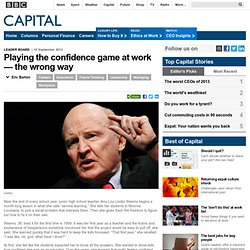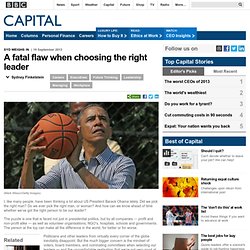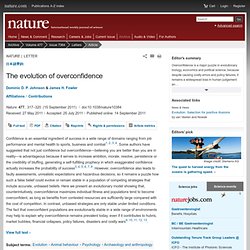

Jeff Bezos Banned PowerPoint in Meetings. His Replacement Is Brilliant. In his 2018 annual letter, Amazon founder and CEO Jeff Bezos repeated his rule that PowerPoint is banned in executive meetings.

What Bezos replaced it with provides even more valuable insight for entrepreneurs and leaders. In his letter, and in a recent discussion at the Forum on Leadership at the Bush Center, Bezos revealed that "narrative structure" is more effective than PowerPoint. According to Bezos, new executives are in for a culture shock in their first Amazon meetings.
Elon Musk's six secrets to business success. ‘Be There. Will Be Wild!’: Trump All but Circled the Date. For weeks, President Trump and his supporters had been proclaiming Jan. 6, 2021, as a day of reckoning.

A day to gather in Washington to “save America” and “stop the steal” of the election he had decisively lost, but which he still maintained — often through a toxic brew of conspiracy theories — that he had won by a landslide. And when that day came, the president rallied thousands of his supporters with an incendiary speech. Then a large mob of those supporters, many waving Trump flags and wearing Trump regalia, violently stormed the Capitol to take over the halls of government and send elected officials into hiding, fearing for their safety. But if the chaos in the Capitol shocked the country, one of the most disturbing aspects of this most disturbing day was that it could be seen coming.
The president himself had all but circled it on the nation’s calendar. “Big protest in D.C. on January 6th,” Mr. And his supporters took the president at his word. On Jan. 6. Mr. Mr. La sociedad del sándwich mixto: por qué los mediocres dominan el mundo. Piense en un helado de vainilla.

No, mejor aún, piense en un sándwich mixto. Aquí tiene una foto para inspirarse. Enrique Krauze: “El líder populista toca resortes muy primitivos” 1542040553_355502. En un continente de caudillos, donde nacionalismo y revolución han sido dominantes desde las independencias, proclamarse públicamente liberal tiene algo de quijotesco, pero el historiador mexicano Enrique Krauze (Ciudad de México, 1947) asume el riesgo y su último libro, El pueblo soy yo (editorial Debate), es toda una declaración de principios.

El autor de Biografía del poder estuvo recientemente en Madrid para presentar su obra y un documental, con el mismo título, sobre Venezuela, un país que conoce bien y sobre el que opina que “estamos asistiendo a su muerte”. En El pueblo soy yo, Krauze traza una anatomía del poder en América Latina y advierte contra el auge del populismo en nuestros días. PREGUNTA. ¿Qué es para usted el populismo? Para arreglar todo esto hay que leer a Maquiavelo.
Trump es ‘maquiavélico’, pero Obama también lo era. Hay Maquiavelos y Maquiavelos entre los gobernantes de nuestro tiempo.

Porque no es lo mismo la palabra con y sin cursiva. Los gobernantes maquiavélicos, en cursiva, responden al uso corriente de este adjetivo: cínicos y malvados, astutos y maquinadores. Los maquiavélicos, sin cursiva, son los que, consciente o inconscientemente, aplican no el maquiavelismo de la leyenda negra del sabio florentino, sino los consejos que de verdad Nicolás Maquiavelo dejó escritos en El Príncipe: ver el mundo tal como es y no tal como lo imaginamos; saber que gobernar consiste en persuadir y a veces en intimidar; y que sólo con talento y voluntad el príncipe moderno puede domesticar las fuerzas de la adversidad y de lo imprevisible.
A trabajar pero sin jefes. Steve Jobs dijo: “No tiene sentido contratar a personas inteligentes y después decirles lo que tienen que hacer”.

La cita quedaría que ni pintada para arrancar cualquier conferencia o este artículo, pero que una organización trate de llevar a la práctica lo que sugiere ya es otro cantar. ¿La autogestión de los profesionales es posible o tan sólo una bonita utopía de las que les gusta contar a los gurús empresariales? Una de las pocas empresas que se han atrevido a aplicarse al pie de la letra las palabras de Jobs es la estadounidense Zappos. CEO Secrets: Harriet Green offers her key business advice. Jeff Bezos Reveals His No. 1 Leadership Secret. Mentally Strong People: The 13 Things They Avoid. All Successful Leaders Need This Quality: Self-Awareness. Capital - Playing the confidence game at work — the wrong way. Near the end of every school year, junior high school teacher Amy Lou Linder Weems begins a month-long lesson in what she calls “service learning.”

She tells her students in Monroe, Louisiana, to pick a social problem that interests them. Then she gives them the freedom to figure out how to fix it on their own. Weems, 38, tried it for the first time in 1999. It was her first year as a teacher and the hubris and exuberance of inexperience somehow convinced her that the project would be easy to pull off, she said. She learned quickly that it was hard to keep the kids focussed. At first, she felt like the students expected her to know all the answers. “As teachers, we have to go from being sage on the stage to a facilitator of ideas,” Weems said.
The era of running an empire is over... executives need to be partners. — Peter Atwater Business world shift The business world has seen this same kind of shift in the last generation. This wasn’t just a US problem. The new confidence game. Capital - A fatal flaw when choosing the right leader. Politicians and other leaders from virtually every corner of the globe inevitably disappoint.

But the much bigger concern is the mindset of voters, board members, and nominating committees when selecting our leaders — and the uncomfortable realisation that we’re not very good at it. What if we’re not that good at figuring out the most critical challenges and opportunities we want our leader to solve? I’m not even talking about the myriad of mistakes we make in selecting talent when we hire, from preferring people who look and act like us to believing that we can size someone up from an interview (the data on this last point, by the way, shows we are astoundingly bad at that). The single biggest problem — the fatal flaw in choosing presidents, school board leaders, or football coaches — is that we believe we can predict the future rather than looking for a leader who can quickly adapt to whatever the unpredictable future holds. Yet we act as if that is exactly what we are able to do. The evolution of overconfidence : Nature. Affiliations Politics and International Relations, University of Edinburgh, Edinburgh EH8 9LD, UK Dominic D.

P. Johnson Division of Medical Genetics and Department of Political Science, University of California, San Diego, California 92093, USA James H. Capital - Have you been a victim of meeting malpractice? Is this the cruel fate all office dwellers must endure?

The answer is, perhaps surprisingly, no! So many people are subject to what I call “meeting malpractice” that it’s a wonder the trial lawyers haven’t caught onto this one yet. The good news is that somewhere out there savvy managers refuse to play along, instead holding on to the quaint belief that meetings are opportunities for smart people to learn, debate and discuss — and for accountability to be assigned for actions and results.
Capital - How to get the most mileage out of your employees. A Point of View: Why getting the sack was good for Machiavelli. 3 August 2013Last updated at 20:48 ET Painting depicts (l-r) Cesare Borgia, Cardinal Pedro Luis de Borgia, Machiavelli and Micheletto Corella Machiavelli may have bemoaned his fall from favour in 16th Century Florence, but his enforced departure from politics led to the creation of his great work, The Prince, says Sarah Dunant. He is a singularly impressive civil servant. His first job came in '98 after a major change of government. He was still in his twenties and obviously knew some of the right people, but it was also a meritocratic appointment - right from the start he showed an acuity and passion for politics.
Are there too many managers? 29 July 2013Last updated at 04:01 ET Once upon a time there were only workers and owners, but then the age of the manager dawned, explains Lucy Kellaway. There are five million managers in the UK today, 10 times as many as there were 100 years ago. Even if you don't actually manage anyone, your title pretends you do. A conductor is a train manager. An administrator is an office manager.
Continue reading the main story Find out more Lucy Kellaway is an author and Financial Times columnist The Invention of the Manager is broadcast at 13:45 BST on 29 July Episode seven, Sex and the Office, is broadcast at 13:45 BST on 30 July The Magazine is running a fortnight of articles based on edited transcripts from this series.